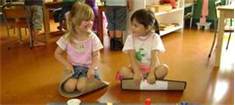Our reading program will improve students reading skill by deviating from the traditional learning skill SQ3R (survey,question,read,recite and review) to natural auditory reading .A software developed by researchers at Cornell University. This approach develops the listening skills that makes learning phonics easy to understand.
clear code instruction - the first scientific improvement on phonics
phonemic awareness - the key to early reading
word building -- using sound and spelling patterns
decoding using unique print-to-speech method
All these creates motivated readers to read with little effort. Teaches phonemic awareness, comprehension and fluency and works quickly with measurable results in as little as 4 weeks at all grade levels K-12.
Hope for children foundation was established in 1983 as a not for profit Corporation.its objective is to help children of all ages acquire the basic knowlwdge of Math,Reading and Sciences in Elementary,Middle and High School level.
Our approach to achieving this objective is through the use of current research findings by such organizations as National Council of Teachers of Mathematics, Center for the Improvement of Early Reading
Achievement, National Research Council that produces national science education standard for middle and high school students.
GRADE SPECIFIC IN ALIGNMENT WITH
COMMON CORE STATE STANDARD
HOME SCHOOL ONLINE Attend an homeschool
online at the comfort of your home.
HOME SCHOOL ONLINE Attend an homeschool
online at the comfort of your home.
HOME SCHOOL ONLINE.
In language arts lesson plans will include but, not limited to Center for the Implementation of Early Reading Achievement (CIERA).
we hope to use the Wright Group Guided Reading (McGraw-Hill) materials and tutor guide as the basic teaching program and branch off from there as the student’s need arises, we will explore a variety of resources to assess a student’s reading level and diagnose instructional needs based upon the areas of reading research, phonics, fluency,
Vocabulary and text comprehension.
The adoption of small group instruction and cooperative learning has been very effective in teaching kids grades k to 8.By using alternative assessments, such as observation of students’ progress we will achieve this goal by reducing oral and written directions and information to easy-to understand steps or parts. adapting written text and materials to facilitate comprehension use of shorter, less complex sentences for students in the early stages of reading.












